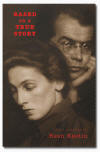Based on a True Story
In Hesh Kestin’s Based on a True Story, three novellas set during the World War II era take readers on a journey from East Africa to the South Seas to Hollywood. A former foreign correspondent, Kestin peppers his tales with exotic plots and resilient characters.
In “The Merchant of Mombasa,” Sergeant Joan Ferrin is a code-breaker in the Royal Canadian Air Force on loan to the British Navy in Kenya. Singled out by the Vice Admiral for being Jewish, she’s promptly promoted and sent to acquire purebred Marwari horses from Abraham Talal, a wealthy Indian (and Jewish) businessman in Mombasa who shrewdly observes, “Ah . . . Send a Jew to deal with a Jew.” The Indian community controlled most of the commerce in East Africa during this period and Ferrin’s superiors seek Talal’s favor, but do not want to associate with merchants, “Indian merchants especially, and Jews so much the less.” Thus, Ferrin takes on the role of negotiator and she and Talal engage in a brief but doomed affair. The devastation lies in what is not said between them. Both Talal and Ferrin are marginalized figures in society based on their gender, religion or race, and Kestin explores their sorrow with understated depth.
While “The Man Who Kissed Stalin’s Wife” is a gripping Tahitian tale filled with war, greed and romance with the natives – not to mention missionaries and Marxist idealism – the main highlight is the third novella, “Based on a True Story.” Laurence “Larry” Bellringer is a gay black scriptwriter in Hollywood in 1939, an anomaly in itself. He works for EZ Shelupsky, the Jewish producer and head of Racetrack Films, the movie studio that caters to “Negro America.” He is the only one making black pictures in America, and he is fiercely proud of his niche in the market. Larry’s description of the infamous EZ matches his bulldog personality: “Everything about EZ was rounded; though his 5-foot-8-inch frame didn’t carry an ounce of fat, he seemed to be composed of a complete set of fully integrated knobs . . . his shoulders were like volleyballs . . . if he’d worn anything but the best custom-made suits, he might have looked like a stack of bowling balls.”
When Larry pitches making a film about Jews (“Wha-at?” I spelled it out. “J-E-W-S.”), EZ thinks he’s off his rocker. He makes films about black people, not white people. But Larry knows a war is coming and doesn’t think race films have a future. Ever the shrewd businessman and “an equal opportunity son of a bitch,” EZ gives it a shot.
“Based on a True Story” dives convincingly into the Golden Age of Hollywood, complete with the wisecracking, slick dialogue of feisty media moguls, the glamour of gambling and horse betting and the glitzy depiction of 1940s L.A. One particularly memorable character is Fritz von Blum, a German screenwriter hired to help Larry pen the infamous script. The following excerpt reveals Kestin’s skill with dialogue as Larry and Fritz quarrel over the script:
“You’re saying a story without a villain? The whole idea is Father Antonio breaks away from the conquistadors, or maybe defends them, or maybe he’s challenged by the Spaniards as an Indian-lover, or maybe–”
“We should leave room for . . . uncertainty, no? Clarity in logic, yes, but in art–”
“You know what, Fritz? You ought to know this. Wasn’t it Goering who said every time he hears the word culture he reaches for his gun . . .”
“Hanns Johst. Many people think Hermann Goering, but Goering was quoting Johst. Wenn ich ‘Kultur’ höre . . . entsichere ich meinen Browning. It was in Johst’s play ‘Shlageter.’ Terrible work. Not Goering, but a playwright.” He smiled. “Like us.”
“Well, every time you say art I break out in hives.”
Kestin’s clear knack for clever banter shines throughout the piece. What could have been stock characters in a classically clichéd Hollywood plot are rendered genuine, fleshed-out individuals through Kestin’s skill with language. These characters have gumption, they have heart, they have panache. And they’re not afraid to talk back. Another bonus: “Based on a True Story” is frequently hilarious. This gem in Kestin’s collection makes Based on a True Story worth checking out.





